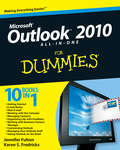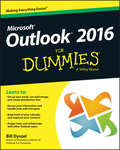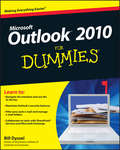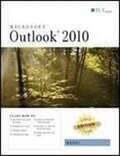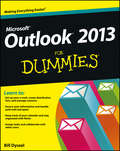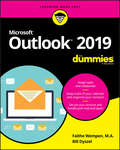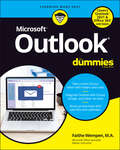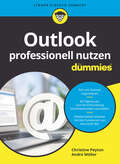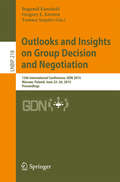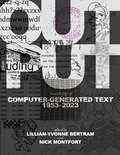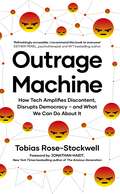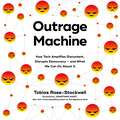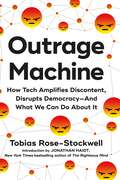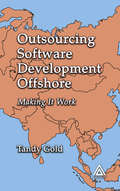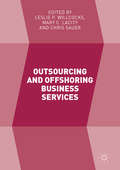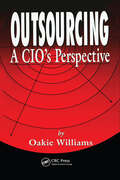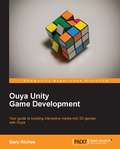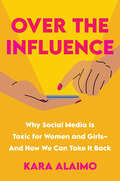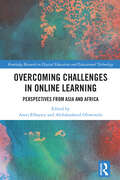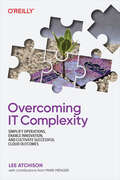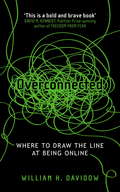- Table View
- List View
Outlook 2010 All-in-One For Dummies
by Jennifer Fulton Karen S. FredricksExtensive coverage on using Microsoft Outlook to manage and organize your dayAs the number one e-mail client and personal information manager, Microsoft Outlook offers a set of uncomplicated features that maximize the management of your e-mail, schedule, and general daily activities, with the least amount of hassle possible. Comprised of ten minibooks in one and packed with more than 800 pages, this All-in-One For Dummies reference walks you through the convenience of Microsoft Outlook and introduces you to the newest features of the 2010 version.After a description of how to get started with Outlook 2010, you'll get complete coverage on e-mail basics, advanced e-mail features, working with the calendar, managing contacts, and working with Business Contact Manager. You'll learn how to track tasks, take notes, and record items in the journal, as well as customize and manage Outlook and get mobile with Outlook.Offers soup-to-nuts coverage of Microsoft Outlook 2010, the newest version of the number one most popular e-mail managerWalks you through getting started with Outlook and e-mail basics, and gradually progresses to more advanced features and capabilities of e-mailExplains how to work with the Outlook 2010 calendar and manage your contactsAddresses tracking tasks, taking notes, recording items in the journal, and working with Business Contact ManagerShows you how to customize your Outlook, manage all the information within Outlook, and take Outlook on the roadGet a whole new outlook on Outlook 2010 with this complete guide!
Outlook 2010 For Dummies
by Bill DyszelGet up to speed on the new features of Outlook 2010 with this fun and friendly guideAlthough Microsoft Outlook is the number one most popular e-mail and productivity tool, many utilize only a fraction of its true potential. This easy-to-understand guide walks you through an abundance of often-overlooked tips and tricks so that you can take advantage of all that Outlook has to offer.Outlook 2010 For Dummies introduces you to the user interface, and explains how to use the To-Do bar, filter junk email, and make the most of Outlook's anti-phishing capabilities. Before you know it, you'll be managing e-mail folders; sharing your calendar; using RSS support; integrating tasks with OneNote, Project, Access, and SharePoint Services; accessing data with two-way sync and offline access; and more.Shares invaluable advice for taking advantage of the newest version of the most popular e-mail and productivity tool: Outlook 2010Reveals little-known tips and tricks of underused features of Microsoft OutlookPresents information in the beloved fun and friendly For Dummies style, showing you how to manage your e-mail, share your calendar, use RSS support, access data, and moreDescribes how to manage your day by filtering junk e-mail, using the To-Do bar, taking advantage of anti-phishing capabilities, and much moreThis helpful guide shows you how to work smart with Outlook 2010!
Outlook 2010 For Dummies
by Bill DyszelGet up to speed on the new features of Outlook 2010 with this fun and friendly guide Although Microsoft Outlook is the number one most popular e-mail and productivity tool, many utilize only a fraction of its true potential. This easy-to-understand guide walks you through an abundance of often-overlooked tips and tricks so that you can take advantage of all that Outlook has to offer. Outlook 2010 For Dummies introduces you to the user interface, and explains how to use the To-Do bar, filter junk email, and make the most of Outlook’s anti-phishing capabilities. Before you know it, you'll be managing e-mail folders; sharing your calendar; using RSS support; integrating tasks with OneNote, Project, Access, and SharePoint Services; accessing data with two-way sync and offline access; and more. Shares invaluable advice for taking advantage of the newest version of the most popular e-mail and productivity tool: Outlook 2010 Reveals little-known tips and tricks of underused features of Microsoft Outlook Presents information in the beloved fun and friendly For Dummies style, showing you how to manage your e-mail, share your calendar, use RSS support, access data, and more Describes how to manage your day by filtering junk e-mail, using the To-Do bar, taking advantage of anti-phishing capabilities, and much more This helpful guide shows you how to work smart with Outlook 2010!
Outlook 2010: Basic (Student Manual, First Look Edition)
by Axzo Press StaffThis ILT Series course covers the basic functions and features of Outlook 2010. After an introduction to Outlook's window components and the Help system, students will read and send e-mail messages using several techniques. Then they will learn how to manage e-mail messages and attachments, configure message options, and use search folders. Students will also learn to manage contacts and use the People Pane, work with tasks, and create appointments. Finally, they will learn to send and respond to meeting requests.
Outlook 2013 For Dummies
by Bill DyszelThe fun and friendly way to manage your busy life with the new Outlook 2013 As the number one e-mail client and personal information manager, Microsoft Outlook offers a set of uncomplicated features that maximize the management of your e-mail, schedule, and general daily activities, with the least amount of hassle possible. This easy-to-understand guide walks you through Outlook 2013 and introduces you to the latest features. You'll learn how to find information quickly, handle e-mail, coordinate schedules, keep current with contacts and social networks, and much more. Walks you through getting started with Outlook 2013 and then provides you with complete coverage on e-mail basics, advanced e-mail features, working with the calendar, managing contacts, and integrating Outlook with other applications Shows you how to track tasks, take notes, and record items in the journal, as well as filter out junk e-mail, activate Outlook's privacy and security features, and more Explains how to customize your Outlook, manage all the information within Outlook, and take Outlook on the road Outlook 2013 For Dummies offers you a whole new outlook on Outlook 2013!
Outlook 2019 For Dummies
by Bill Dyszel Faithe WempenGet up to speed with the world’s best email application — Outlook 2019 Of the millions of people who use Outlook, most only use about two percent of its features. Don’t stay in the dark! Outlook 2019 For Dummies shows you how to take advantage of often-overlooked tips and tricks to make it work even better for you. Inside, you’ll find information on navigating the user interface; utilizing the To-Do bar; filtering junk email; smart scheduling; RSS support; using electronic business cards; accessing data with two-way sync and offline and cloud based access, and much more! Make the most of Outlook's anti-phishing capabilities Share your calendar Integrate tasks with other Microsoft applications and services Manage email folders If you’re upgrading to the latest version — or have never used this popular email tool — this book makes it easier than ever to get Outlook working for you.
Outlook For Dummies
by Faithe WempenLearn all about the best application for emailing, scheduling, collaborating, and just plain getting stuff done Did you know that Microsoft Outlook can do everything, including cook your dinner? Okay, it can’t cook your dinner. But it can deliver your email, filter out the junk, help you organize your life, sync data to the cloud, integrate with iOS and Android, and about a zillion other things. Outlook For Dummies shows you how to work all the basic and advanced features of the Office 2021 version. Outlook is loaded with interesting productivity tools that most people—even in business environments—don’t know about. Did you know you can create automated mail-handling rules? Translate messages into other languages? Share your calendar with other people? It’s true, and when people start wondering how you suddenly got to be so productive, you can tell them: Outlook For Dummies. Take a stroll around the basic interface and emailing capabilities of Outlook for Office 2021 Use Outlook to create daily and monthly schedules, manage a to-do list, organize messages into folders, and make notes for later reference Discover advanced and little-known features that will help you get organized and stay on top of things Sync email across your devices and access Outlook from any computer, tablet, or phone For users who are brand-new to Outlook and those upgrading to the latest version, this book makes it simple to get going.
Outlook im Beruf für Dummies (Für Dummies)
by Christine Peyton Andre MöllerEin überquellendes Postfach, zu viele Meetings, nie genügend Zeit? Nutzen Sie Outlook richtig - Nicht nur zum Mailen, sondern auch und vor allem zur Organisation Ihrer Kontakte, Termine und Aufgaben. Christine Peyton und Andre Möller zeigt Ihnen, wie Ihnen Outlook hilft, Prioritäten zu setzen, Mails und Unterlagen schnell wiederzufinden, Wichtiges von Unwichtigem zu unterscheiden und vieles mehr. Halten Sie Ihren Posteingang aufgeräumt, deaktivieren Sie lästige Funktionen, archivieren Sie mit System. Planen Sie Besprechungen mit mehreren Teilnehmern, lassen Sie sich Terminüberschneidungen anzeigen, reservieren Sie Räume und Geräte. Beherrschen Sie das Chaos!
Outlook professionell nutzen für Dummies (Für Dummies)
by Christine Peyton Andre MöllerEin überquellendes Postfach, zu viele Meetings, nie genügend Zeit? Nutzen Sie Outlook richtig - nicht nur zum Mailen, sondern auch und vor allem zur Organisation Ihrer Kontakte, Termine und Aufgaben. Christine Peyton und Andre Möller zeigen Ihnen, wie Ihnen Outlook hilft, sich zu organisieren, Prioritäten zu setzen und vieles mehr. Planen Sie Besprechungen mit mehreren Teilnehmern und nutzen Sie die Funktionen von Microsoft 365 für die Zusammenarbeit. Halten Sie Ihren Posteingang aufgeräumt, finden Sie Mails und Unterlagen schnell wieder, lassen Sie sich Terminüberschneidungen anzeigen, reservieren Sie Räume und Geräte und archivieren Sie mit System. Beherrschen Sie das Chaos!
Outlooks and Insights on Group Decision and Negotiation
by Bogumił Kamiński Gregory E. Kersten Tomasz SzapiroThis book constitutes the proceedings of the 15th International Conference on Group Decision and Negotiation, GDN 2015, held in Warsaw, Poland, in June 2015. The GDN meetings aim to bring together researchers and practitioners from a wide spectrum of fields, including economics, management, computer science, engineering, and decision science. From a total of 119 submissions, 32 papers were accepted for publication in this volume. The papers are organized into topical sections on group problem structuring and negotiation, negotiation and group processes, preference analysis and decision support, formal models, voting and collective decision making, conflict resolution in energy and environmental management, negotiation support systems and studies, online collaboration and competition, and market mechanisms and their users.
Output: An Anthology of Computer-Generated Text, 1953–2023
by Nick Montfort Lillian-Yvonne BertramAn anthology of seven decades of English-language outputs from computer generation systems, chronicling the vast history of machine-written texts created long before ChatGPT.The discussion of computer-generated text has recently reached a fever pitch but largely omits the long history of work in this area—text generation, as it happens, was not invented yesterday in Silicon Valley. This anthology, Output, thoughtfully selected, introduced, and edited by Lillian-Yvonne Bertram and Nick Montfort, aims to correct that omission by gathering seven decades of English-language texts produced by generation systems and software. The outputs span many different types of creative writing and include text generated by research systems, along with reports and utilitarian texts, representing many general advances and experiments in text generation.Output is first and foremost a collection of outputs to be encountered by readers. In addition to an overall introduction, each of the excerpts is introduced individually and organized by fine-grain genre including conversations, humor, letters, poetry, prose, and sentences. Bibliographic references allow readers to learn more about outputs and systems that intrigue them. Although Output could serve as a reference book, it is designed to be readable and to be read. Purposefully excluded are human–computer collaborations that were conceptually defined but not implemented as a computer system.Copublished by Counterpath Press
Outrage Machine: How Tech Amplifies Discontent, Disrupts Democracy – and What We Can Do About It
by Tobias Rose-StockwellForeword by Jonathan Haidt, author of THE RIGHTEOUS MINDAn invaluable guide to understanding the technology that captures our attention with anger.The original internet was not designed to make us upset, distracted, confused, and outraged. But something unexpected happened at the turn of the last decade, when a handful of small features were quietly launched at social media companies with little fanfare. Together, they triggered a cascading set of dramatic changes to how media, politics, and society itself operates-inadvertently creating an Outrage Machine we cannot ignore.Author, designer, and media researcher Tobias Rose-Stockwell shares the defining shifts caused by these technologies, and how they have ignited a society-wide crisis of trust. Drawing from cutting-edge research and vivid personal anecdotes, Rose-Stockwell illustrates how social media has bound us to an unprecedented system of public performance, training us to react rather than reflect, and attack rather than debate.OUTRAGE MACHINE reveals the triggers and tactics used to exploit our anger, unpacking how these tools hack our deep tribal instincts and psychological vulnerabilities, and how they have become opportunistic platforms for authoritarians and a threat to democratic norms everywhere.But this book is not just about the problem. In a story spanning continents and generations, Rose-Stockwell explores how every new media technology disrupts our ability to make sense of the world, from the printing press to the telegraph, from radio to television. OUTRAGE MACHINE situates social media within a historical cycle of confusion, violence, and emerging tolerance. Using clear language and powerful illustrations, this book reveals the magnitude of the challenges we face, while offering realistic solutions and a promising pathway out.
Outrage Machine: How Tech Amplifies Discontent, Disrupts Democracy – and What We Can Do About It
by Tobias Rose-StockwellForeword by Jonathan Haidt, author of THE RIGHTEOUS MINDAn invaluable guide to understanding the technology that captures our attention with anger.The original internet was not designed to make us upset, distracted, confused, and outraged. But something unexpected happened at the turn of the last decade, when a handful of small features were quietly launched at social media companies with little fanfare. Together, they triggered a cascading set of dramatic changes to how media, politics, and society itself operates-inadvertently creating an Outrage Machine we cannot ignore.Author, designer, and media researcher Tobias Rose-Stockwell shares the defining shifts caused by these technologies, and how they have ignited a society-wide crisis of trust. Drawing from cutting-edge research and vivid personal anecdotes, Rose-Stockwell illustrates how social media has bound us to an unprecedented system of public performance, training us to react rather than reflect, and attack rather than debate.OUTRAGE MACHINE reveals the triggers and tactics used to exploit our anger, unpacking how these tools hack our deep tribal instincts and psychological vulnerabilities, and how they have become opportunistic platforms for authoritarians and a threat to democratic norms everywhere.But this book is not just about the problem. In a story spanning continents and generations, Rose-Stockwell explores how every new media technology disrupts our ability to make sense of the world, from the printing press to the telegraph, from radio to television. OUTRAGE MACHINE situates social media within a historical cycle of confusion, violence, and emerging tolerance. Using clear language and powerful illustrations, this book reveals the magnitude of the challenges we face, while offering realistic solutions and a promising pathway out.
Outrage Machine: How Tech Amplifies Discontent, Disrupts Democracy—And What We Can Do About It
by Tobias Rose-StockwellAmazon's Best History Book of the Month for July 2023An invaluable guide to understanding how the internet has broken our brains—and what we can do to fix it. The original internet was not designed to make us upset, distracted, confused, and outraged. But something unexpected happened at the turn of the last decade, when a handful of small features were quietly launched at social media companies with little fanfare. Together, they triggered a cascading set of dramatic changes to how media, politics, and society itself operate—inadvertently creating an Outrage Machine we cannot ignore. Author, designer, and media researcher Tobias Rose-Stockwell shares the defining shifts caused by these technologies, and how they have ignited a society-wide crisis of trust. Drawing from cutting-edge research and vivid personal anecdotes, Rose-Stockwell illustrates how social media has bound us to an unprecedented system of public performance, training us to react rather than reflect, and attack rather than debate.Outrage Machine reveals the triggers and tactics used to exploit our anger, unpacking how these tools hack our deep tribal instincts and psychological vulnerabilities, and how they have become opportunistic platforms for authoritarians and a threat to democratic norms everywhere. But this book is not just about the problem. In a story spanning continents and generations, Rose-Stockwell explores how every new media technology disrupts our ability to make sense of the world, from the printing press to the telegraph, from radio to television. Outrage Machine situates social media within a historical cycle of confusion, violence, and emerging tolerance. Using clear language and powerful illustrations, this book reveals the magnitude of the challenges we face, while offering realistic solutions and a promising pathway out.
Outsourcing IT: A Governance Guide
by Rupert Kendrick"Outsourcing IT - A Governance Guide" addresses three componentsof the governance of IT outsourcing: the IT outsourcing process;the nature of governance and the use of methodologies and toolsfor the implementation of governance principles; and, themanagement of risk within the IT outsourcing process. Theobjectives of the book are first, to provide boards of directorswith clear criteria for the application of governance principlesin an IT outsourcing environment; and, second, to provideguidance on useful strategies, processes and procedures for theirimplementation. The author, Rupert Kendrick, is a non-practisingsolicitor and, for many years, was a partner in a medium-sizedlaw firm. He has written, trained and consulted widely in thelegal profession on legal IT issues.
Outsourcing Software Development Offshore: Making It Work
by Tandy GoldIn Offshore Software Development: Making It Work, hands-on managers of Offshore solutions help you answer these questions:What is Offshore and why is it an IT imperative?What do you need to do to successfully evaluate an Offshore solution?How do you avoid common pitfalls?How do you confront security an
Outsourcing and Offshoring Business Services
by Leslie P. Willcocks Mary C. Lacity Chris SauerBringing together theoretical and empirical studies from the Journal of Information Technology, this book provides a definitive guide to research discovered on the growing global sourcing phenomenon. Paying particular attention to Information Technology Outsourcing (ITO) and Business Process Outsourcing (BPO), theoretical chapters explore insightful ways of thinking about the different facets of outsourcing, and provide useful information to practitioners and researchers. Empirical chapters report the findings of 405 major research studies into the risks and successes of relationships between customer and vendor, the development of trust in these relationships, the factors affecting locations for offshoring, and specialized offshoring organizations such as captive centres. In this comprehensive study, the editors present an expert review of the historical development of this field, and offer analysis of emerging findings and practices for the future.
Outsourcing: A CIO's Perspective
by Oakie D. WilliamsAs global competition grows more fierce, companies continue to look for ways to increase their competitive edge without jeopardizing profit margins. Today's corporations are starting to realize the competitive advantage that Information Technology (IT) can bring to a company. These corporations are also realizing that staying current with technology requires a great deal of effort, risk, and expense. This is one of the primary reasons CEO's are considering outsourcing as an alternative.Written by a CIO who has successfully maneuvered through the outsourcing process, Outsourcing: A CIO's Perspective addresses the realistic expectations and the most commonly asked questions about IT outsourcing, while reviewing it's advantages and disadvantages. This text identifies key elements that can be used to assess the feasibility of securing a profitable and manageable outsourcing agreement. It provides a convincing case that even if the final decision is to not outsource, the result of the process will identify potential business improvement opportunities.
Ouya Unity Game Development
by Gary RichesA clear, concise, and practical guide that will teach you how to build your own console game and become an indie developer.This book is for game developers who are interested in developing games for the Ouya console on the Unity game engine. It is assumed that you have a basic understanding of Unity.
Over the Influence: Why Social Media is Toxic for Women and Girls - And How We Can Take it Back
by Kara AlaimoThis essential book is a rallying cry for women to recognize and reject the ways social media is being weaponized against us — and instead wield it to empower ourselves.In Over the Influence, communication professor and CNN Opinion contributor Kara Alaimo reveals how social media is affecting every aspect of the lives of women and girls—from our relationships and our parenting to our physical and mental well-being. Over the Influence is a book about what it means to live in the world social media has wrought—whether you&’re constantly connected or have deleted your accounts forever. Alaimo shows why you&’re likely to get fewer followers if you&’re a woman. She explains how fake news is crafted to prey on women&’s vulnerabilities. She reveals why so much of the content we find in our feeds is specifically designed to hold us back. And she explains how social media has made the offline world an uglier place for women.But we can change this. Alaimo offers up brilliant advice for how to get over the influence—how to handle our daughters&’ use of social media, use dating apps to find the partners we&’re looking for, use social networks to bolster our careers, and protect ourselves from sextortionists, catfishers, and trolls. She also explains what we need to demand from lawmakers and tech companies.Over the Influence calls on women to recognize and call out the subtle (and not-so-subtle) sexism and misogyny we find online, reject misinformation that is targeted to us because of our gender, and use our platforms to empower ourselves and other women.
Overcoming Challenges in Online Learning: Perspectives from Asia and Africa (Routledge Research in Digital Education and Educational Technology)
by Areej ElSayary Abdulrasheed OlowoseluThis book examines four distinct areas of education that suffered as a result of the COVID-19 pandemic in Asian and African regions, and tackles the challenges and barriers that came as a result of the shift to online learning. Presenting perspectives from China, Malaysia, Nigeria, and the UAE, chapters frame research within the context of "innovation experiences" to explore transformative learning theory, and set out the ways in which leaders, educators, students, and parents adapted to learning during the pandemic. Foregrounding four central topics (challenges and barriers; teaching and learning; assessment; educational technology; and interactive learning environments), the volume provides globally relevant findings and implications for the effects of the pandemic on learning in these regions, and furthers the field of educational technology more broadly. Topics covered range from teaching and leading in the online learning environment to educational technology and the interactive learning space. Sharing innovative experiences to aid progression and share best practice for online learning moving forward, the book will be highly relevant to researchers, academics, and students in the fields of higher education, online and eLearning, and technology in education.
Overcoming IT Complexity: Simplify Operations, Enable Innovation, and Cultivate Successful Cloud Outcomes
by Lee AtchisonThe cloud promises cost savings, agility, and more. But the increasing complexity of modern IT systems often prevents businesses from realizing the outcomes they sought by moving to the cloud in the first place. At the core of this complexity is technical debt. Ad hoc decisions, traditional approaches, and "quick and dirty" solutions add up to fragile, more complex systems (and organizations)--reducing the pace of change, driving up costs, and degrading security. To succeed in the cloud, you first have to manage the problems IT complexity creates. This practical guide will help.If you're tasked with designing, delivering, or approving IT systems that support business growth, this book will teach you the principles and strategies you need to break out of silos, reassess traditional thinking, provide the business a better competitive position, and achieve cloud success across the company.You'll learn:How to assess your current IT environment to identify complexity-centered risksHow to structure cross-functional teams to reduce friction pointsHow to create a framework for IT investments that's aligned with your business goalsHow to measure your outcomes for continued success
Overcoming Worries About Body Image and Eating: A Self-help Guide for Teenagers (Helping Your Child)
by Anne Stewart Caz Nahman Joanna AdamsMost teenagers worry about their body and appearance at some point, and some may try to alter their eating in order to change their weight or shape. If you are spending a lot of time worrying about how you look or what you are eating, it can become overwhelming and have a big impact on your life. The aim of this book is to help you to understand a bit more about these worries, what you can do about them and, most importantly, how you can develop a healthy relationship with your body and with food. If these worries take hold, there is a risk of developing an eating disorder or becoming depressed. Eating disorders can have a huge and negative impact on your physical health, your emotional wellbeing, your relationships and social life. They can take control of your mind and body, which makes it difficult to feel motivated to recover, and it can be a long and difficult journey to get back on track, so it's better to tackle these worries early on. Written by clinicians with many years of experience working in specialist eating disorder services for children and adolescents, this book follows an approach called cognitive behavioural therapy (CBT), which is a really useful way of helping us to make sense of our experiences and overcome the difficulties that we face. CBT is an evidence-based approach, which means that lots of research has been done to evaluate it and show that it can be helpful. The book includes help and support on: · Adolescent development, how we make sense of our experiences, healthy eating and how to look after yourself during the teenage years. · How you can stop body image and eating difficulties taking hold including ideas for feeling good about yourself, dealing with stress and managing social media. There is a chapter which focuses on issues for boys/young men. · How to get help from family, friends or professionals if you are struggling. There is also a chapter for parents/carers and families with suggestions on how they can help. Overcoming for Teenagers is a series to support young people through common mental health issues during adolescence, using scientific techniques that have been proven to work.Series editors: Associate Professor Polly Waite and Emeritus Professor Peter Cooper
Overcoming Worries About Body Image and Eating: A Self-help Guide for Teenagers (Helping Your Child)
by Anne Stewart Caz Nahman Joanna AdamsMost teenagers worry about their body and appearance at some point, and some may try to alter their eating in order to change their weight or shape. If you are spending a lot of time worrying about how you look or what you are eating, it can become overwhelming and have a big impact on your life. The aim of this book is to help you to understand a bit more about these worries, what you can do about them and, most importantly, how you can develop a healthy relationship with your body and with food. If these worries take hold, there is a risk of developing an eating disorder or becoming depressed. Eating disorders can have a huge and negative impact on your physical health, your emotional wellbeing, your relationships and social life. They can take control of your mind and body, which makes it difficult to feel motivated to recover, and it can be a long and difficult journey to get back on track, so it's better to tackle these worries early on. Written by clinicians with many years of experience working in specialist eating disorder services for children and adolescents, this book follows an approach called cognitive behavioural therapy (CBT), which is a really useful way of helping us to make sense of our experiences and overcome the difficulties that we face. CBT is an evidence-based approach, which means that lots of research has been done to evaluate it and show that it can be helpful. The book includes help and support on: · Adolescent development, how we make sense of our experiences, healthy eating and how to look after yourself during the teenage years. · How you can stop body image and eating difficulties taking hold including ideas for feeling good about yourself, dealing with stress and managing social media. There is a chapter which focuses on issues for boys/young men. · How to get help from family, friends or professionals if you are struggling. There is also a chapter for parents/carers and families with suggestions on how they can help. Overcoming for Teenagers is a series to support young people through common mental health issues during adolescence, using scientific techniques that have been proven to work.Series editors: Associate Professor Polly Waite and Emeritus Professor Peter Cooper
Overconnected: The Promise and Threat of the Internet
by William H. DavidowIn Feb 2006, a Danish newspaper printed twelve highly provocative caricatures of the prophet Muhammad. The drawings landed on the internet and quickly circled the globe. As a direct result, riots ensued and at least 139 people died. This is just one example of overconnection. The consequences of an over-connected world cannot be ignored. In this important book, William H. Davidow takes a highly pragmatic approach by recognising that the digital clock cannot be turned back in terms of ubiquitous connectivity, but urges that caution and forethought is applied to the systems we build in the future. Davidow identifies four distinct levels of connection: Underconnected, Interconnected, Highly Connected and Overconnected. Highly Connected is the ideal state we must strive for and avoid spilling into Overconnected.
